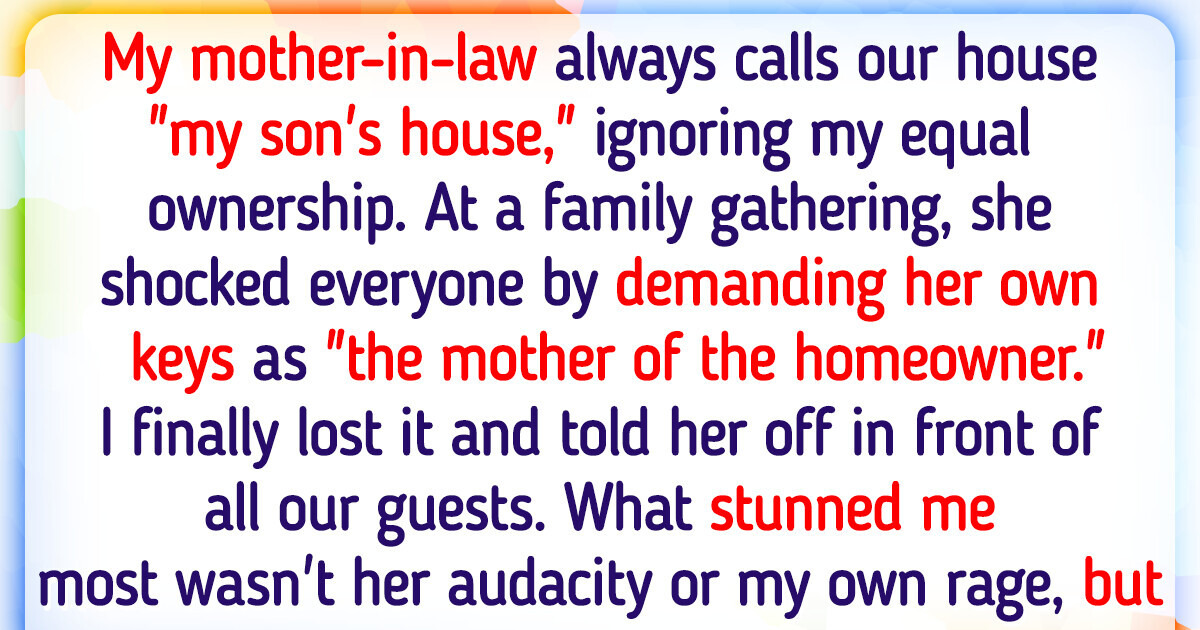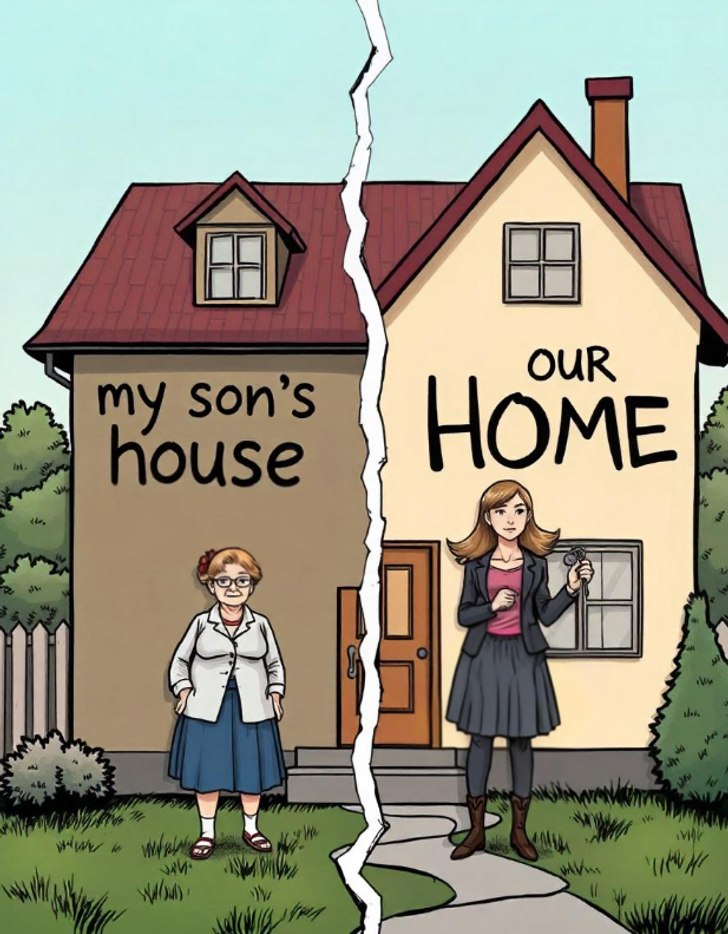Your husband should’ve said something when it happened, no way he didn't hear it before. That's why mil thought she can say whatever she wanted.
I Lost It When MIL Called Our House “My Son’s” and Made an Unbelievable Request

Today, we address a common family challenge: in-law relationships and homeownership disputes. Our reader Penelope shares her struggle with these issues. As you read, consider your own experiences with family boundaries.
We’ll explore communication strategies and the importance of unity in marriage when facing such conflicts. Let’s examine Penelope’s situation and our advice for navigating this delicate matter.

Penelope, your letter struck a chord with many of us here at the editorial board. The struggle between maintaining healthy boundaries and keeping family peace is one that resonates deeply. Your situation with your mother-in-law highlights a common yet complex issue that many couples face. Let’s dive into this delicate matter and explore some perspectives that might help you navigate these turbulent waters.
The weight of ownership

Penelope, you’re absolutely right to feel frustrated. Co-owning a home is a significant milestone, representing not just a financial investment, but an emotional one as well. Your mother-in-law’s persistent refusal to acknowledge your role in this accomplishment is more than just an oversight — it’s a dismissal of your partnership with her son. This behavior, intentional or not, chips away at your sense of belonging and value within your own home. It’s crucial for you to stand firm in your right to be recognized as an equal owner and contributor to your household.
The act of purchasing a home together is often a defining moment in a couple’s journey, symbolizing shared dreams, mutual trust, and a commitment to building a future together. Your equal contribution to this endeavor deserves equal recognition, not just from your partner, but from your extended family as well. The home you’ve created together is a physical manifestation of your partnership, and every corner, every decision, every payment reflects the joint effort you’ve put into making this space yours.
The power of words

The language we use shapes our reality, and your mother-in-law’s choice of words is creating a narrative that excludes you. By consistently referring to it as “my son’s house,” she’s not just making a semantic error; she’s reinforcing a mindset that diminishes your role in your family unit. This isn’t just about property rights — it’s about respect and recognition. You’ve tried the gentle approach, which shows your initial patience and desire to maintain harmony. However, sometimes a more direct conversation becomes necessary when subtle hints are repeatedly ignored.
Words have the power to include or exclude, to uplift or to diminish, and in family settings, they can set the tone for generations of relationships. Your mother-in-law’s language choices, whether conscious or not, are establishing a hierarchy where you’re placed on a lower rung. This linguistic pattern, if left unchecked, could potentially influence how other family members perceive your role and status within the family. Moreover, it may even impact how you view yourself over time, potentially leading to feelings of inadequacy or resentment that could seep into other areas of your life and relationships.
Boundaries and respect

Your mother-in-law’s demand for keys crosses a significant boundary. A home is a sanctuary, and the decision to grant access is one that should be made jointly by you and your husband. Her claim of rights “as the mother of the homeowner” further underscores her failure to recognize your equal standing in your marriage and homeownership. It’s essential to establish clear boundaries, not just for your peace of mind, but for the health of your relationship with your husband and his family.
Boundaries are not walls meant to keep people out, but rather guidelines that define where one person ends and another begins. They’re crucial for maintaining healthy relationships and personal well-being. In your case, setting boundaries with your mother-in-law isn’t about excluding her from your lives, but about ensuring that your role and your home are respected. This situation also presents an opportunity for your husband to demonstrate his commitment to your partnership by standing firm with you in establishing these necessary boundaries. Remember, a united front in such matters can significantly strengthen your marital bond, while also sending a clear message about the nature of your partnership to extended family members.
The emotional outburst

Penelope, while your frustration is completely understandable, the public nature of your outburst may have complicated the situation. Emotions often build up over time, and when they finally burst, it can be in ways we later regret. However, it’s important to remember that your feelings are valid, even if the delivery wasn’t ideal. This moment can serve as a catalyst for much-needed change in your family dynamics.
It’s natural for emotions to overflow after prolonged periods of suppression, and your reaction, while perhaps not tactfully expressed, was a genuine response to ongoing disrespect and invalidation. In many ways, this outburst has brought the issue to the forefront, making it impossible to ignore any longer.
While the immediate aftermath may be uncomfortable, it has created an opening for honest dialogue and potential resolution. It’s worth considering that sometimes, it takes a dramatic moment to shake people out of established patterns and force them to confront issues they’ve been avoiding or unaware of. Your mother-in-law’s tears, while distressing, may indicate that she’s finally registering the seriousness of the situation and the depth of your feelings.
Navigating the aftermath

Crocodile tears. Pure theatrics. "Boo-hoo! I finally succeeded in pushing my daughter-in-law into snapping at me and she finally let me have what I deserve. Oh, poor me!". After repeated "gentle hints" failed, you should've corrected her more firmly [but politely and calmly] a lot sooner before she had provoked you too far: "This is OUR house. We have a 50/50 partnership investment. TOGETHER. Thank you.".
Moving forward, it’s crucial to have an open and honest conversation with your husband. His support is vital in addressing this issue with his mother. While he may feel caught between two important women in his life, he needs to understand the impact his mother’s behavior has on you and your marriage. Together, you should present a united front in setting clear expectations with your mother-in-law about how your home and your partnership are discussed and respected.
This conversation with your husband is an opportunity to strengthen your bond and reaffirm your commitment to each other. It’s a chance to discuss not just this specific issue, but your broader vision for how you want to navigate family relationships and potential conflicts in the future.
As you plan your approach to addressing the situation with your mother-in-law, consider writing down your thoughts and feelings beforehand. This can help you express yourself clearly and calmly when the time comes. Remember, the goal isn’t to punish or alienate your mother-in-law, but to establish a new, healthier dynamic that respects all parties involved. It may also be helpful to reflect on your mother-in-law’s perspective — her behavior, while inappropriate, may stem from her own insecurities or difficulties in adjusting to her evolving role in her son’s life.
You’re not wrong for wanting recognition and respect in your own home.

Yes. Most importantly, your husband should defend you and tell his mommy to respect you.
While the manner of expression might have been less than ideal, the underlying issue is real and needs addressing. Consider this an opportunity to reset boundaries and expectations with your mother-in-law, with your husband’s support. Remember, a home is more than just bricks and mortar — it’s a reflection of your partnership and shared life. Stand firm in your right to have that partnership acknowledged and respected.
With open communication and firm boundaries, you can work towards a more harmonious family dynamic where everyone’s role is valued and respected. This situation, challenging as it is, offers a chance for growth — personal growth, growth in your marriage, and growth in your extended family relationships.
By addressing this issue head-on, you’re not just solving a current problem, but potentially setting a positive precedent for how conflicts and misunderstandings will be handled in your family going forward. Stay true to your feelings and your worth, Penelope, but also remain open to understanding and reconciliation. With patience, clear communication, and mutual respect, it’s possible to transform this difficult situation into a turning point that strengthens your family bonds and ensures that your role is properly acknowledged and celebrated.

Just when you thought navigating in-law relationships couldn’t get any more challenging, we received a letter that might make you think twice. A reader writes to us about an unexpected proposition from her mother-in-law that has thrown her household into turmoil.
Comments
Related Reads
My Stepmom Demands That I Give Up on My Dream So Her Daughter Can Go to College

I Refused to Give Up My Baby, So My Mom Exposed a Terrible Secret

My Daughter Thought She Was Above Me, I Let Reality Prove Her Wrong

18 Seniors Whose Sharp Wit Proves Humor Only Gets Better With Age

16 Moments That Remind Us to Stay Kind Even If the World Turns Ice Cold

16 Stories That Prove Kindness Still Wins in Our Broken World

14 Times Reality Proved to Be a Better Screenwriter Than Hollywood Could Ever Be

20 Stories That Remind Us to Stay Kind Even When Life Stops Playing Fair

I Refused to Let My MIL Own My Family Budget, Now My Marriage Is on Thin Ice

A Stranger Humiliated My Daughter at Disney World—He Picked the Wrong Mom to Mess With

10 Moments Where Kindness Didn’t Argue—It Acted

I Refuse to Let a Strange Lady Touch My Rare Birthmark for "Good Luck"—Now I’m Being Threatened
